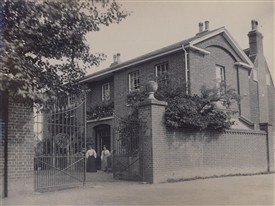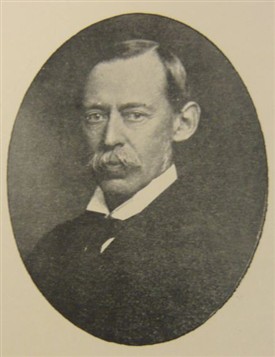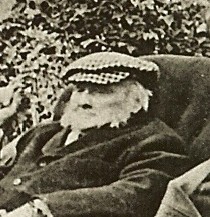'Unpleasant Relations at Meldreth, 1888'




In a case before the Melbourn Magistrates reported in the Royston Crow of 31 August 1888 under the heading ‘Unpleasant relations at Meldreth’, Charles Dash, labourer, of Meldreth was charged with assaulting Hallack Pamplin on 8th August in the grounds of Meldreth Court.
Mr Times, solicitor, from Hitchin, appeared for the complainant and Mr Ellison, solicitor, from Cambridge, for the defendant. Mr Times told the court he was appearing in support of two summons that had been taken out and it might save time if he addressed himself to both cases. One was for assault and the other for using threatening language – neither was a serious offence. ‘But he was instructed by Mr J G Mortlock, a gentleman living in the neighbourhood, whose character was well known, to bring these cases before the Magistrates because there was a state of things in Meldreth unparalleled in the division.’ He went on to say that ‘it was almost incredible that in the nineteenth century a quiet village in Cambridgeshire should be disturbed day after day by….an organised system of intimidation carried on by certain persons, some of whom would be before the Magistrates.’
Mr Times continued ‘if the Magistrates….did not do what they could to put a stop to this state of affairs – either by convicting the persons who were guilty of such conduct or taking some other steps, such as going into the village and reading the Riot Act, he could not say that a serious breach of the peace would not occur.’ He said that it was ‘an open secret that there was a family dispute: Mr Mortlock had the misfortune to have a daughter who had married strongly against his wishes’ and litigation had been entered into to try to compel him to continue paying a sum of money which he had paid previously to support his daughter. The solicitor for the defendant, Mr Ellison, complained that this was ‘entirely outside the case.’ After further exchanges, this objection was upheld by the Magistrates and Mr Times agreed to confine himself to the circumstances of the case before the court.
‘On the evening of 8th August, the defendant was one of a crowd of a hundred and fifty persons who followed Mr Mortlock from Meldreth Railway Station to Meldreth Court where he lives. (Note: no explanation was given in court for the size of this gathering. One witness referred to attending a ‘Home Rule’ meeting in the village that evening and it is possible that this may explain why there were so many people, though not why they followed Mr Mortlock from the Station). Mrs Hubert Ellis, the daughter of Mr Mortlock, made her way into the grounds. Mr Mortlock ordered both her and her husband to leave.’ When she wouldn’t he instructed the complainant (Hallack Pamplin, a gardener employed at Meldreth Court) to remove her from the premises. ‘Pamplin took hold of Mrs Hubert Ellis to remove her whereupon the defendant (Charles Dash) came in, put himself in a fighting attitude, wanted to have five rounds with the complainant and put his fist close up to his face’. This was really all that happened: the defendant soon went away and later apologised saying that ‘nothing of the kind would occur again.’
Giving evidence, Mr Pamplin recounted that the incident occurred at about quarter to ten on the night of 8th August. Mr Mortlock asked him to remove Mrs Ellis from the premises but when he took hold of her hand, which he claimed he did gently, she screamed ‘Murder!’. When the defendant ran up to him and put his fists up he said that he had let go of Mrs Ellis to defend himself and at this point she ‘fell to the ground in hysterics’. Mr Ellison asked the Clerk to the Justices (Mr Wortham) ‘where is the assault, Mr Wortham?’ The Clerk replied that he could not see one.
Mr John George Mortlock was later called to the witness stand and told the Court that he was the owner of Meldreth Court and on the day in question had come down from London and been followed home from the station by a crowd of people. “When I reached Meldreth Court, my daughter, Mrs Hubert Ellis, accompanied I believe by Mr Charles Ellis, rushed in at the iron gate and attempted, I am told, to force her way into the front of the house. I told her she had better get off the premises. I told her so twice. Then I told my people to remove her without using any unnecessary force of violence.” He was not cross-examined.
Mr Ellison, for the defendant, said that the charge had been trumped up and hoped the Magistrates would dismiss it. Before giving their decision (unusually) they heard another case involving Mrs Maria Louisa Ellis, wife of Mr Charles Ellis, farmer at Meldreth who was charged with using threatening language to Emily Simmance, ‘a lady’s maid’ at Meldreth Court. The charge arose out of the same set of circumstances. The complainant had heard a knock on the door on the evening in question and when she opened it Mrs Hubert Ellis came to the door, threatened her with violence and “put her fist within two inches of my face…..she was much excited and her bonnet was half off.” Emily Simmance denied that she had been obliged by Mrs Mortlock to take out the summons, though on the next morning “Mr Mortlock wrote out a form of summons, having taken my evidence down, and I was driven to Mr Wortham’s office.”
Mr Times asked to be allowed to call a police witness. ‘The Magistrates thought, however, they had heard enough evidence and retired to consider their decision. On their return, after a short absence, the Chairman said Dash would be fined 5 shillings with 13 shillings costs and Mrs Ellis would be bound over in her own recognisances in the sum of £20 to keep the peace for the next 12 months.’
With thanks to Linda Clarke for her help in researching this case





No Comments
Add a comment about this page